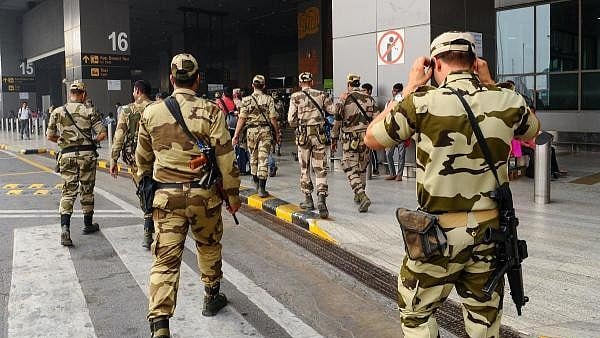
Representative image of CISF jawans.
Credit: PTI File Photo
New Delhi: In a move aimed at strengthening security across all major and minor Indian seaports, the Centre has designated the Central Industrial Security Force (CISF) as the new safety regulator for about 250 facilities located along the country's maritime borders, officials said on Friday.
The categorisation of the central paramilitary force (under the Union Home Ministry) has been done by the Ministry of Ports, Shipping and Waterways through an order issued on November 18, CISF Deputy Inspector General (DIG) Ajay Dahiya said.
The paramilitary force has been designated as a Recognised Security Organisation (RSO) for seaports under the International Ship and Port Facility Security (ISPS) code. An RSO acts as a regulator for seaport security.
ISPS is a mandatory security regime for international shipping.
"This is a significant reform and a path-breaking step to enhance security across India's seaports. As ports play a vital role in trade, logistics and India's growing Blue Economy, the government is introducing a series of measures to modernise and standardise port security nationwide," Dahiya said.
The plan is expected to be put in place within the next six months, according to the 2023 updated guidelines issued by the Ministry of Home Affairs (MHA), he said.
A senior officer said this was a "challenging" assignment for the force as it gets "new powers", leading to the acquisition of a lot of technical expertise. He said the force has been guarding ports since 1971, and it is currently present at 13 major ones like the Chennai Port, JNPT in Mumbai and the Cochin Port.
"For all things related to port security, the CISF will be the nodal or regulatory authority. We will work in three domains-- providing consultancy for the establishment of security systems and gadgets, deploying hybrid security manpower and training all stakeholders in the sector," the senior officer said.
He said two such training sessions for private security personnel, cargo operators and other staff present on the seaport have recently been concluded by the force.
Till now, seaport security was being dealt with by the Indian Register of Shipping (IRS) under the Directorate General of Shipping, and there was a requirement for a professional agency in this area, a second officer said.
The idea to have a professional and sovereign RSO emerged from various top-level security meetings chaired by the prime minister and the home minister over the last few years, where the vulnerability and security gaps in the 254 big and small seaports of the country were underlined, he said.
According to official data, out of these ports, only about 65-68 are "actively" engaged in cargo operations.
Core security functions, like counter-terrorist and anti-sabotage operations, at all EXIM (export-import) ports will be carried out by the CISF, while non-core duties such as traffic management, gate control and other ancillary jobs will be rendered by private security agencies or state police forces.
It is also estimated that the CISF may require as many as 80,000 personnel, at the rate of 1,000 for each, over the next few years to secure 80 major seaports as part of a new tech-enabled security paraphernalia, officials said.
At present, the force has around 5,300 personnel deployed for these duties.
A hybrid security model, with a mix of CISF and private security personnel, improved screening systems, and dedicated training institutions for port-security personnel, is also being introduced, according to the blueprint of the new system.
"These steps represent a major stride toward creating secure, efficient and future-ready ports that support India's economic growth and global maritime ambitions," DIG Dahiya said.